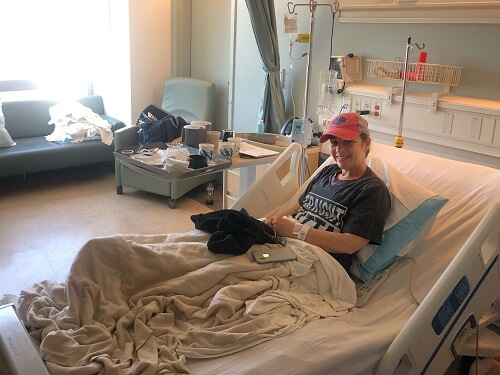No less a national treasure than Mr. Fred Rogers once said, “Look for the helpers.”
Well, we can all stop looking, because we found her: Dr. Catherine Pearlman is a social worker and writer for the likes of The Wall Street Journal, Parenting and CNN.com. Her calling is to help families function more smoothly, help right some of the world’s wrongs through her writing and, oh yeah, help complete strangers by donating one of her kidneys.
This most giving of Power Figures gave Bare Necessities heaps of useful life advice. Reading it will make you feel like a better person; following her lead will make you one.
Q: How did you come up with the idea for The Family Coach? What are some of the most common issues families are grappling with?
A: I was a social worker in a prevention program to help teen mothers avoid losing their kids to abuse and neglect. I would travel around meeting the moms in their own homes and quickly realized I could see the dynamics more clearly. Years later, after having my own kids, I saw lots of parents struggling with sleep, feeding, discipline, sibling rivalry and potty training. These parents weren’t at risk of losing their kids, but they were exhausted and battling issues that were easily solved with a few pointers. That’s when I decided to start The Family Coach. The idea was to observe a family in their home during the most difficult part of their day. Then I would work with the parents to make changes.
Most parents deeply love their children and want to best for them, but sometimes it’s confusing how to proceed. When a child protests over dinner, should the parent make something else or let the child skip a meal? Should a parent intervene in sibling quarrels or let them work it out? It can be tempting to give in to a child’s demands, but sometimes the easiest way out creates bigger, longer-lasting problems. I point families in the right direction. Seeing parents enjoy their time with their kids more is exceptionally rewarding.[perfectpullquote align=”left” bordertop=”false” cite=”” link=”” color=”” class=”” size=””]”To me, ‘opting in’ is finding a way to have a career and a life on my own terms”[/perfectpullquote]
Q: You’ve written about work and life being incompatible when your kids were young. Tell us about the third way you found, “opting in.”
A: There’s a fantasyland where women work hard at their careers while also being fully present at home in seamless harmony. After years of searching, I realized this perfect place is a painful fallacy. I firmly believe that women can make it to the top of any field they choose, but that path may not be completely congruent with having a firm hand in the day-to-day raising of children. When women leave the workforce because they want more time with their family, they’re seen as opting out. When I was faced with this choice, I decided to reinvent myself. I went back to school for my PhD, opened The Family Coach and began a new career path. To me, this is “opting in,” finding a way to have a career and a life on my own terms. It’s not always easy being a stay-at-home working mom. My career isn’t what I planned 20 years ago, and I’m okay with that.

Q: Since “we all need a little coaching sometimes,” what advice do you wish you could give families?
A: Whenever I speak to a group of mothers I always say, “Forgive yourself. No one is a perfect parent.” Modern parents put unrealistic expectations on ourselves. We think we should buy organic everything, cook every meal, have clean houses and children who behave at all times. Our marriages should be joyous; our vacations, Instagram-worthy. I don’t know why we do that to ourselves because I can tell you after visiting hundreds of homes, no one has it all figured out. We are all struggling with something.
In my book, Ignore It!, I talk about the concept of “good enough.” Being perfect shouldn’t even be the goal. It turns out kids do better when their parents mess up mildly at times, forgetting a lunch box, being late for school, even losing their tempers. Kids learn to adjust to a less-than-perfect world. They rise up, and these life challenges don’t stump them in the future. Good enough—being loving and meeting basic needs with zeal—is better than perfect. Let’s all take a breath and pat ourselves on the back for making it through the day. If the day went badly, wake up tomorrow and try it another way. We can always do a little better next time, and it’s never too late to make a change.
Q: What’s it like being your own boss? How do you set boundaries? What’s a typical day like?
A: There are lots of pros and cons. The flexibility is the best. I’ve never had to miss a game or a school play due to a work conflict. I’m home for dinner and tuck-ins. No one tells me when to come and go, and I work well under those circumstances. As a family, we’ve been able to travel often, and we spend a lot of time together. All of that has been a blessing, and I will never regret forging my own path.
But when you own your business, you’re also never off the clock. I feel nagging pressure that there’s something that needs to get done. Another issue with being an entrepreneur is health insurance. My husband is a full-time freelancer, so after years of very expensive health insurance, I decided to find a second job. Now I work for myself as The Family Coach, and I work full-time as an assistant professor of social work. I teach for nine months a year, mostly online, so the flexibility is still present. There are lots of times I wish I had a different arrangement. I think about what else I could accomplish if I was able to spend more time on my business and writing. But I also take a lot of pride in being able to provide benefits for my family. It’s a constant balance, with ups, downs and curves. More often than not, though, it works for us.
Q: Your kids’ schools often come up in your writing (the bathroom pass; your daughters’ shorts length; her “provocative” pants). Why are girls still bearing the brunt of these well-intentioned, short-sighted policies, and what can we do about it?
A: Turns out the power of the pen can bring about change. Both the bathroom policy and the dress code were revised after those columns. I often write to process difficult moments. I don’t always know where I’m going, but it helps to get my thoughts out. As much as I believe we’ve come a long way on gender, I’m still blindsided regularly by the inequality, mixed messages and double standards. I talk about it at home with both my son and my daughter. I try to write about it and do what I can in my community. Subtle, institutionally-based biases against girls are a societal problem that’s going to take time, advocacy and legislation to change. One by one, though, we can make changes that will improve opportunities for girls and women.

Q: Tell us about donating a kidney. There’s a huge gulf between being a good person and being good enough to relinquish an organ! What compelled you to leap from thinking about it to doing it?
A: I wasn’t walking around thinking, Hmm, who can I find to donate my kidney to? But years ago, a mom in my son’s class needed one. I wasn’t able to give at that time—luckily, someone else did—but I never forgot the fear and vulnerability of this mom asking people to help her survive. When I saw a flyer in Starbucks of a man needing a kidney with my blood type, I instantly thought, I think I can do this now. I imagined, and later confirmed, that it must be exceedingly difficult to put your face on a flyer asking strangers to help you. How could I walk away?
There actually wasn’t a big leap. As soon as I read the paper and saw Eli’s face, I decided to go for it. Fifteen minutes later, I had completed the health questionnaire in my car. I never thought about backing out, and the more I learned about kidney donation, the more confident I became. I learned I really didn’t need my kidney. I had a very complete physical that showed I was healthy, and I knew this kidney could potentially change someone’s life. The decision to donate wasn’t really a decision. If felt like a calling, something I felt lucky I could do.
Q: What’s life been like since? Do you believe in putting good out there and it coming back to you?
A: Not much has changed, but every day I get out of the shower and see my scars. They’re a nice reminder that I put myself out there to help someone. It feels pretty good. The funny thing about putting good out there is that it immediately comes back to you. I feel so fulfilled and happy that I was able to help improve Eli’s health. There are no guarantees, but at least I tried. Eli is doing well, and I’ve been lucky enough to get to know him and his wife. I received such a positive feedback from this experience. Friends, family and total strangers have been very supportive. I couldn’t have done this without my husband Jeff and the kids being on board. Jeff was with me for three days in the hospital sleeping by my side, then taking care of everything for weeks afterwards. It felt like something special we did together. My son mentioned that he would like to donate a kidney when he grows up. I hope that my story helps lots of other people on the waiting list find their match. [perfectpullquote align=”right” bordertop=”false” cite=”” link=”” color=”” class=”” size=””]”My scars are a nice reminder that I put myself out there to help someone”[/perfectpullquote]
Q: What drives you? What does empowerment mean to you?
A: To me, empowerment means that someone has the ability and the opportunity to go after their goals and dreams. I was lucky enough to grow up with a mom who worked and a dad who showed his daughters how to do what boys typically did. Gender roles were fluid, and the world was presented as my oyster. I wasn’t told what to major in or what kind of career would be best. I was told indirectly that I needed to find a job to support myself, and that any job is valuable if you enjoy it. My upbringing set me up to feel empowered.
I’m driven by my desire to help people in lots of ways. Sometimes that’s teaching. Sometimes that’s writing. Sometimes that’s donating my kidney. I have good health, a strong mind, resources and passion. It pains me to see others suffering, even a little bit, so I try to use what I’ve been given to help others live their best life.
THE WORLD ACCORDING TO CATHERINE
Favorite bra: Warner’s Cloud 9 Wireless Bra.
Wardrobe staple: Flip-flops. California has ruined me.
Greatest extravagance: My cleaning lady.
Happy place: On my paddleboard with the sun shining and dolphins swimming nearby.
Character flaw: I can’t go with the flow.
Personal mantra: You can do this.
Personal hero: Billie Jean King.
Comfort food: Korean BBQ.
Biggest mistake: Not going abroad in college.
Secret to living a great life: Keep your eyes on your own paper.
Drop a line or ask a question to Dr. Pearlman in the comments below, and read about more extraordinary Power Figures now!
